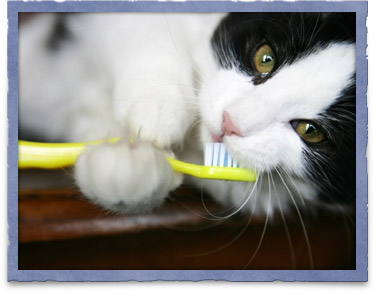Pet Dental Care
 Dental hygiene is an important part of your pet's health, and poor dental health can often be the cause of serious illness. If left untreated, dental problems can lead to larger systemic problems in your pet due to oral bacteria entering the blood stream and damaging the kidneys, heart and liver. Many of these problems can be avoided by scheduling regular dental check-ups and dental cleanings for your pet at Community Animal Hospital, combined with good dental hygiene at home.
Dental hygiene is an important part of your pet's health, and poor dental health can often be the cause of serious illness. If left untreated, dental problems can lead to larger systemic problems in your pet due to oral bacteria entering the blood stream and damaging the kidneys, heart and liver. Many of these problems can be avoided by scheduling regular dental check-ups and dental cleanings for your pet at Community Animal Hospital, combined with good dental hygiene at home.
Your Pet's Dental Examination at Community Animal Hospital
Veterinary dentistry is considerably more involved and time-consuming than basic human dentistry. Cleaning your pet's teeth requires general anesthesia followed by a day-long hospital stay. While your pet is under light anesthesia, our experienced veterinary team will perform the following:
- Oral examination
- Diagnosis and treatment of periodontal disease
- Supra and subgingival ultrasonic scaling
- Extractions of any diseased teeth
- Polishing
- Irrigation
Should we find any issues, we will discuss them with you and offer treatment options for your pet. We are experienced dental practitioners and can offer a number of dental procedures and oral surgeries. To be sure you're doing all you can to protect your pet's health and keep him or her feeling great, please make regular dental examinations and cleanings a part of your pet's regular preventive care plan.
 Caring for Your Pet's
Caring for Your Pet's
Teeth at Home
At home, please brush your pet's teeth regularly and check for any signs of problems. Brushing your pet's teeth is the single most important way to maintain your companion's good oral health. If performed regularly, brushing your pet's teeth dramatically decreases the incidence of gingivitis and can increase the interval between teeth cleaning appointments.
If you are unsure of how to brush your pet's teeth, please ask a staff member at Community Animal Hospital for instructions. We are happy to help.
Signs of Pet Dental Problems
Symptoms of dental disease include:
- Bad breath (one of the first signs of dental disease)
- A yellowish-brown crust of tartar on the teeth near the gum line
- Red and swollen gums
- Pain or bleeding when your pet eats or when the mouth or gums are touched
- Decreased appetite or difficulty eating
- Loose or missing teeth
If your pet is experiencing any of the above symptoms, his or her overall well-being and health is also being impacted. Don't wait – please call Community Animal Hospital today at (410) 822-4475 for an appointment.